A Photographer's Reflection—Capturing Tzu Chi's Work in Bodh Gaya, India
Text and photos by Hsiao Yiu-hwa (蕭耀華)
Translated by Wu Hsiao-ting (吳曉婷)
A Photographer's Reflection—Capturing Tzu Chi's Work in Bodh Gaya, India
Text and photos by Hsiao Yiu-hwa (蕭耀華)
Translated by Wu Hsiao-ting (吳曉婷)
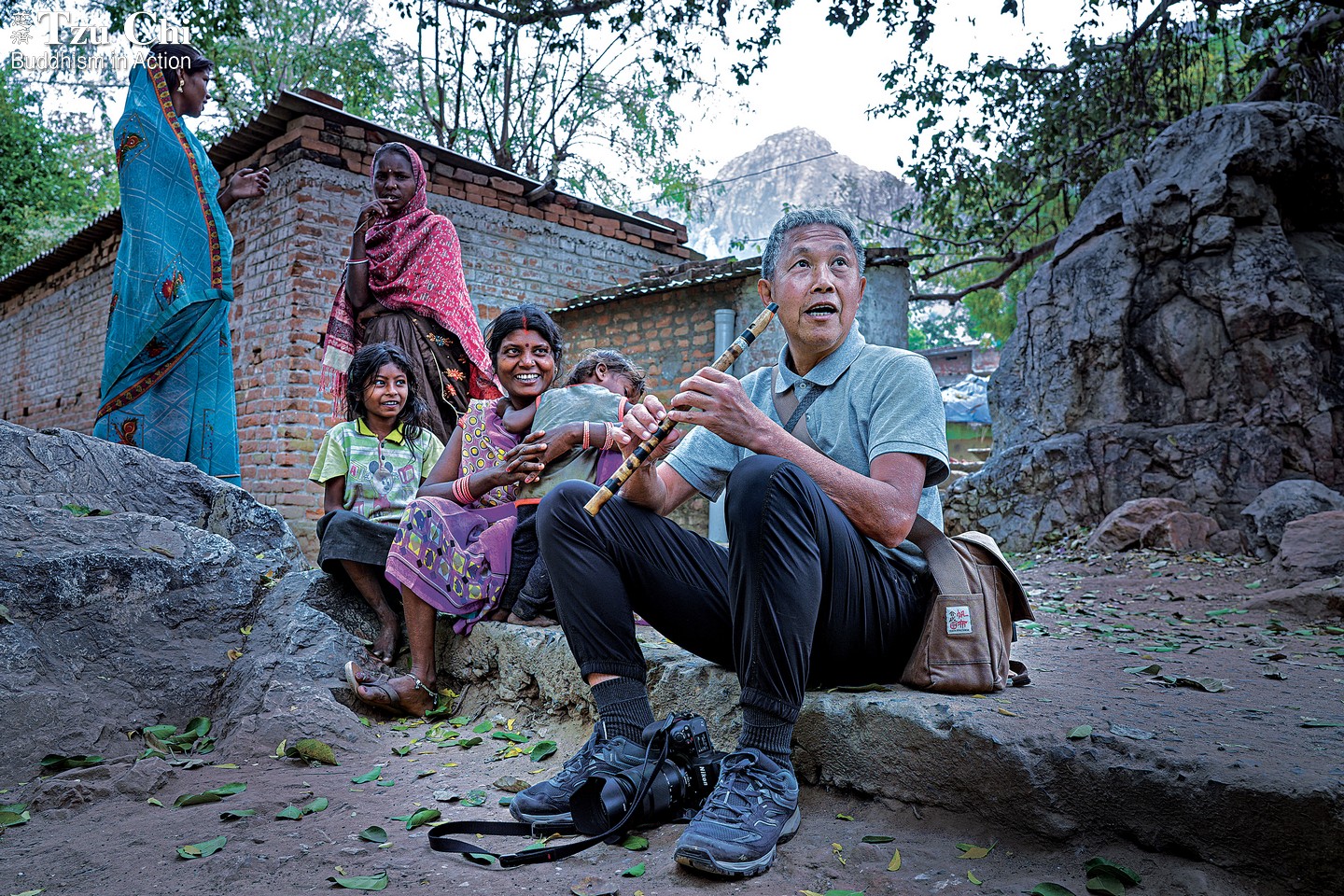
While in India, Tzu Chi Monthly photographer Hsiao Yiu-hwa (蕭耀華) adapted to local ways, which helped him overcome language and cultural barriers and connect with the local people. (Yong Mun Fei)
In the 1980s, a classmate gave me a translated novel as a gift when I graduated from university: Siddhartha by the German author Hermann Hesse. I flipped through a few pages at the time but couldn't grasp its meaning. I moved several times over the years, and the book was eventually lost.
Fast forward to early March 2024, when I traveled to Bodh Gaya, India, on official business. While Bodh Gaya might be unfamiliar to some people, it is a sacred site for Buddhists. More than 2,500 years ago, Prince Siddhartha attained enlightenment there and became the Buddha. Today, Buddhist organizations from around the world have established temples and centers at this holy site. Tzu Chi set up a branch office there in 2023.
My role in India as a photographer for Tzu Chi Monthly was to document the work of Tzu Chi volunteers. The photography assignment was for a month in the spring of 2024, extending throughout March. Toward the end of the assignment, I started experiencing discomfort in my right eye. I noticed a small white spot between my iris and the white of my eye, which caused irritation every time I blinked. I sought help at a hospital after returning to Taiwan, where an ophthalmologist diagnosed me with pterygium. She explained that it is a condition caused by prolonged exposure to intense ultraviolet rays, a common eye ailment for people living in tropical regions.
The doctor told me that pterygium is irreversible. She said that medication may reduce inflammation and prevent its worsening, with surgery as a last resort if it progresses, but there would be no guarantee it wouldn't recur. The doctor prescribed eye drops for a week and told me that if the white spot didn't interfere with my vision, there was no need for further treatment; I could simply live with it.
With a bottle of eye drops in hand, I asked myself on my way home: If I could develop this condition in just a month, how do the locals in India, who have lived there all their lives, manage? My curiosity led me to review the tens of thousands of photos I had taken in the country.
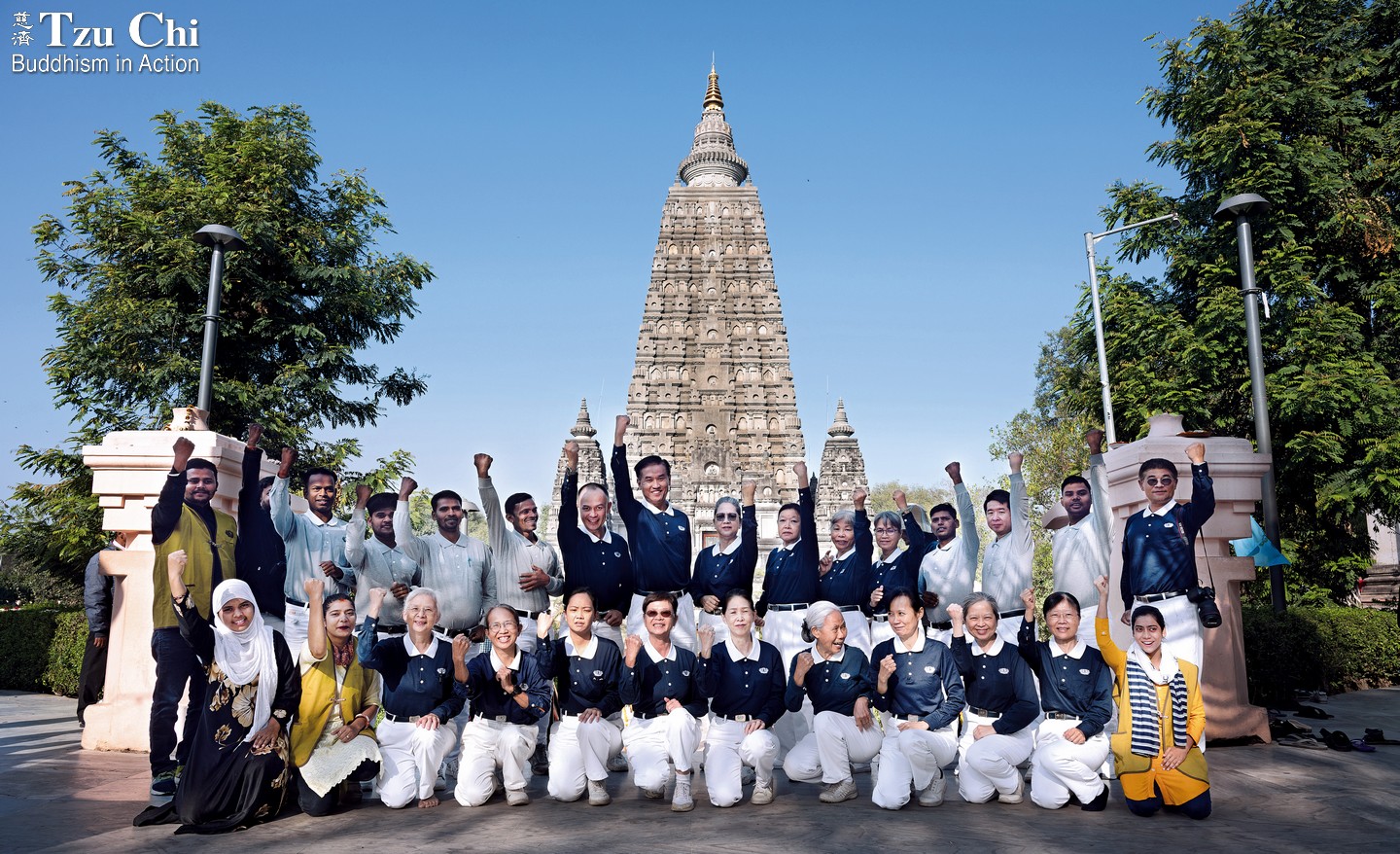
Tzu Chi volunteers from Singapore and Malaysia have been taking turns being stationed in Bodh Gaya since March 2023 and engaging in philanthropic work. On the eve of the anniversary of their mission there, they make a vow in front of the Mahabodhi Temple, the very site where the Buddha attained enlightenment, to persist in their efforts for the local needy.
A hidden tenderness
As I examined the images, I noticed that many locals displayed signs of various ailments. Common issues included eye diseases like cataracts and pterygium, as well as different degrees of physical disabilities and malnutrition. These conditions were most evident at the entrances to Buddhist temples and shrines, where afflicted individuals gathered to seek alms from pilgrims and tourists. The disabilities and low social status of such individuals lead them to seek assistance from Buddhists, whom they believe to be compassionate and charitable.
I visited Buddhist sites many times during my month-long stay in India and often encountered people begging there. My friends had repeatedly advised me against giving alms to them, emphasizing that true compassion requires wisdom and that small, random acts of charity would not resolve their problems. I followed their advice, but one morning, after a mission on Vulture Peak in Rajgir, a withered woman and a blind young man approached my car window. Her humble expression, eyes pleading for help, and the way she reached out with her thin, dry hands deeply affected me.
In that instant, I was reminded of a photograph by American photographer Steve McCurry, shot from inside his car: a woman standing outside his car door with a child in her arm, in the rain, her hand touching the window, seeking a small act of kindness from those inside.
I quickly reached into my pocket, hoping to find something to offer the woman at my car window and capture a genuine moment that reflected the reality of life for those at the bottom of society. However, as I was about to act, the driver started the car. Despite my urgent calls to stop, the car began to move. I only had time to quickly hand over a small token of my sympathy through the window. The woman thanked me and, guiding the blind man, slowly walked away. My chance to capture that moment with my camera was lost.
Although I had missed the chance to take a good photograph, the brief encounter revealed to me a hidden tenderness within myself that I had not previously recognized.
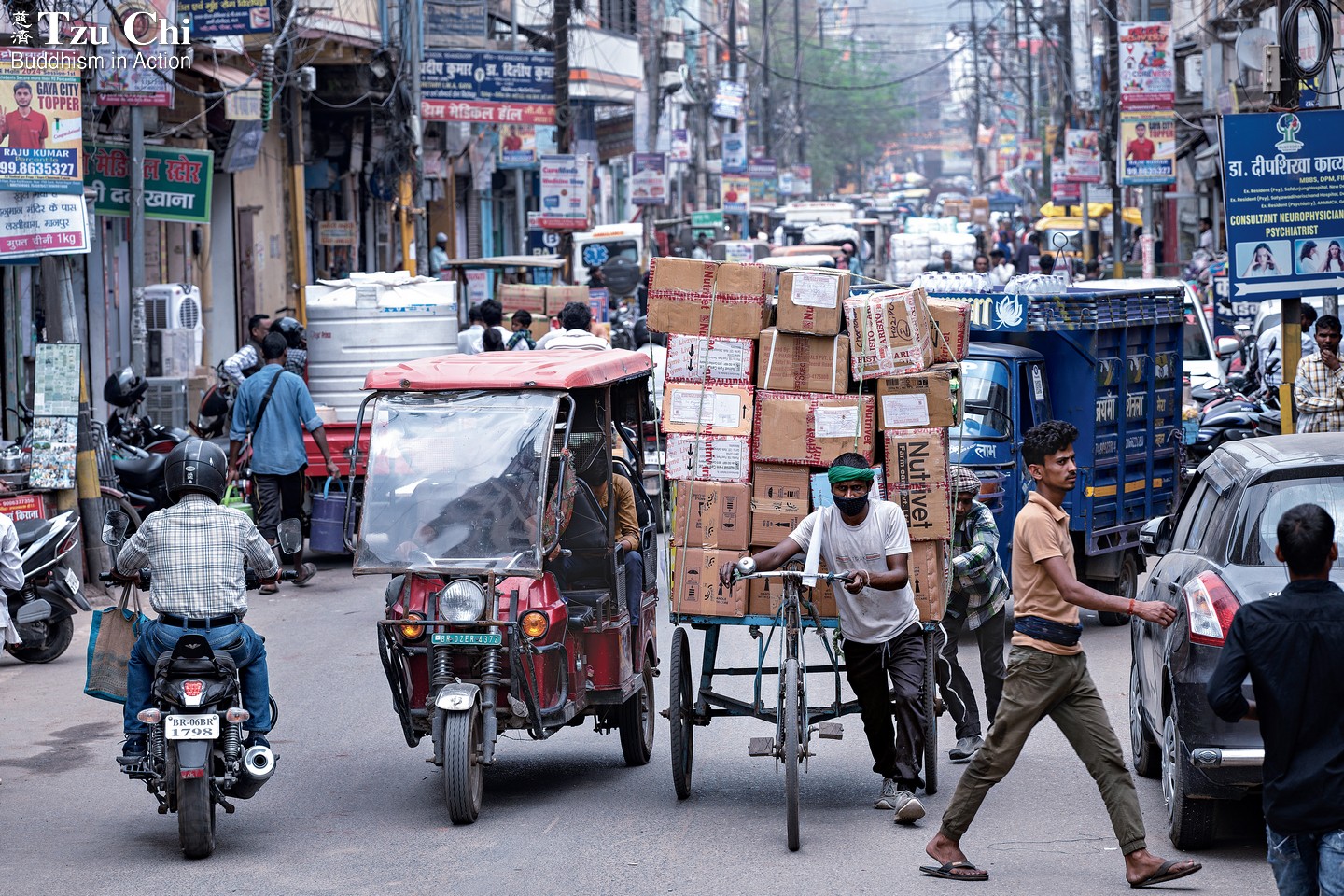
In Gaya's city center, electric rickshaws, motor scooters, cargo-laden three-wheelers, and a steady stream of pedestrians navigate the crowded streets, creating a lively scene that vividly depicts the challenges of daily life.
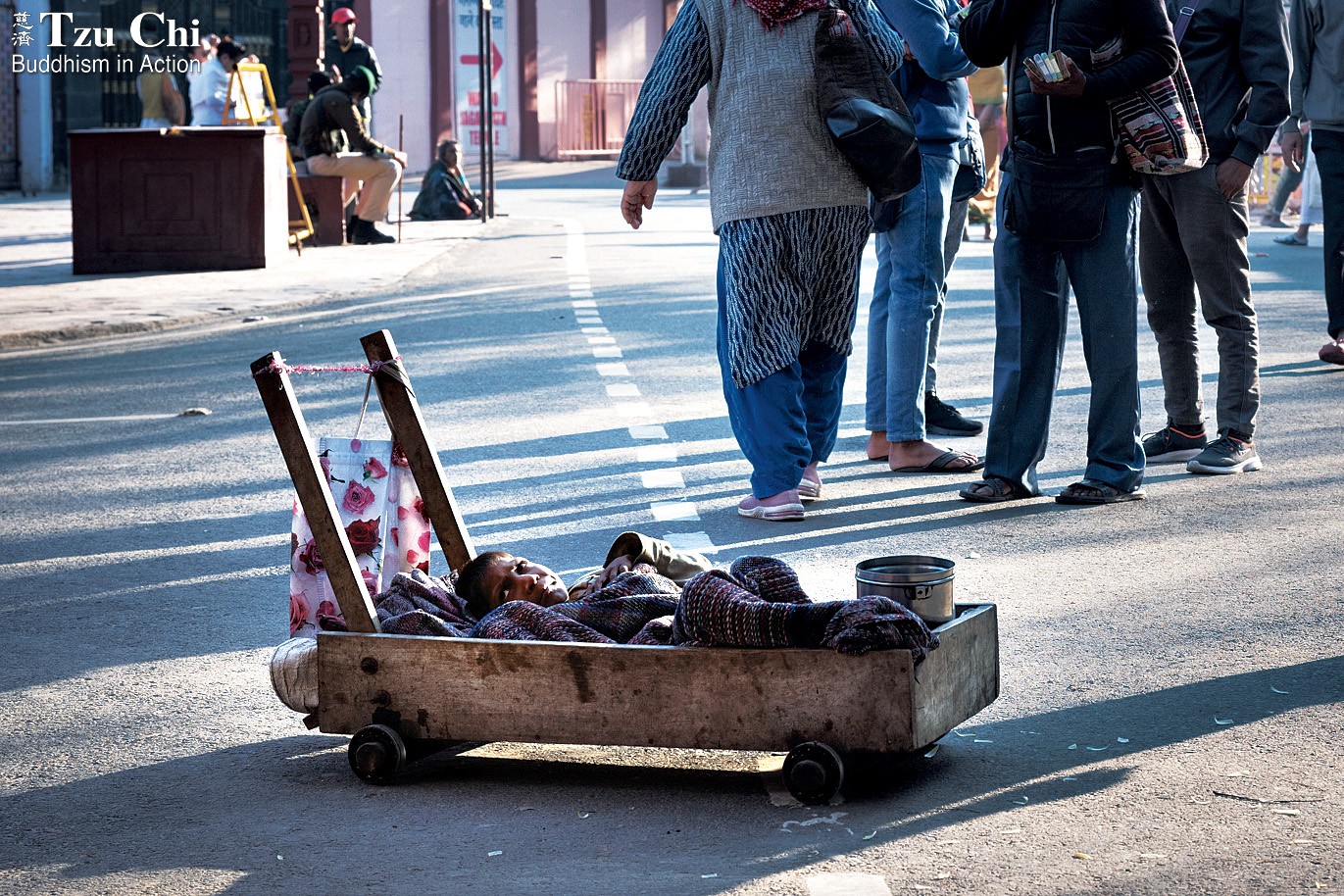
In the early morning light, a severely disabled child lies on a simple handmade wooden cart in front of the Mahabodhi Temple in Bodh Gaya, waiting for the generosity of passersby. Making a living is not easy, but the challenges for disabled individuals are even greater.
Working to make a difference
According to Buddhist scriptures, when Prince Siddhartha ventured outside his palace walls, he encountered an elderly individual, a sick person, a corpse, and a holy man. Deeply troubled by the hardships caused by aging, illness, death, and other afflictions, he began contemplating the path to liberation from these sufferings. After much contemplation without success, he left his home one moonlit night, riding a horse to seek the way. Eventually, he reached enlightenment in Bodh Gaya.
Living in modern times, it is impossible to fully grasp the human sufferings of that era. However, during my month-long stay in the place where the Buddha achieved enlightenment, I observed and experienced many aspects of life that led me to speculate that the conditions for people living at the bottom of society might be nearly the same since then, over 2,500 years ago. For them, there is still much room for improvement in many aspects of life. In other words, it is a region where Tzu Chi can truly make a difference.
The Tzu Chi mission in Bodh Gaya is primarily carried out by volunteers from Singapore and Malaysia. This group of dedicated volunteers averages around 50 years old, with a few being over 70. They stay for varying lengths of time, ranging from one to five months, covering the cost of their own food and lodging. Some return to Singapore or Malaysia, or visit neighboring Nepal when their Indian visas expire, only to come back and continue their diligent work.
These volunteers visit local villages to promote public health, provide health checkups, and discourage alcohol consumption. They reach out to impoverished households, offering care and support, and build Great Love Houses for those in need. They also visit schools to assess educational needs and provide assistance where they can. Additionally, they set up sewing, computer, and English classes, striving to teach marketable skills and change the long-term culture of dependency among disadvantaged local groups.
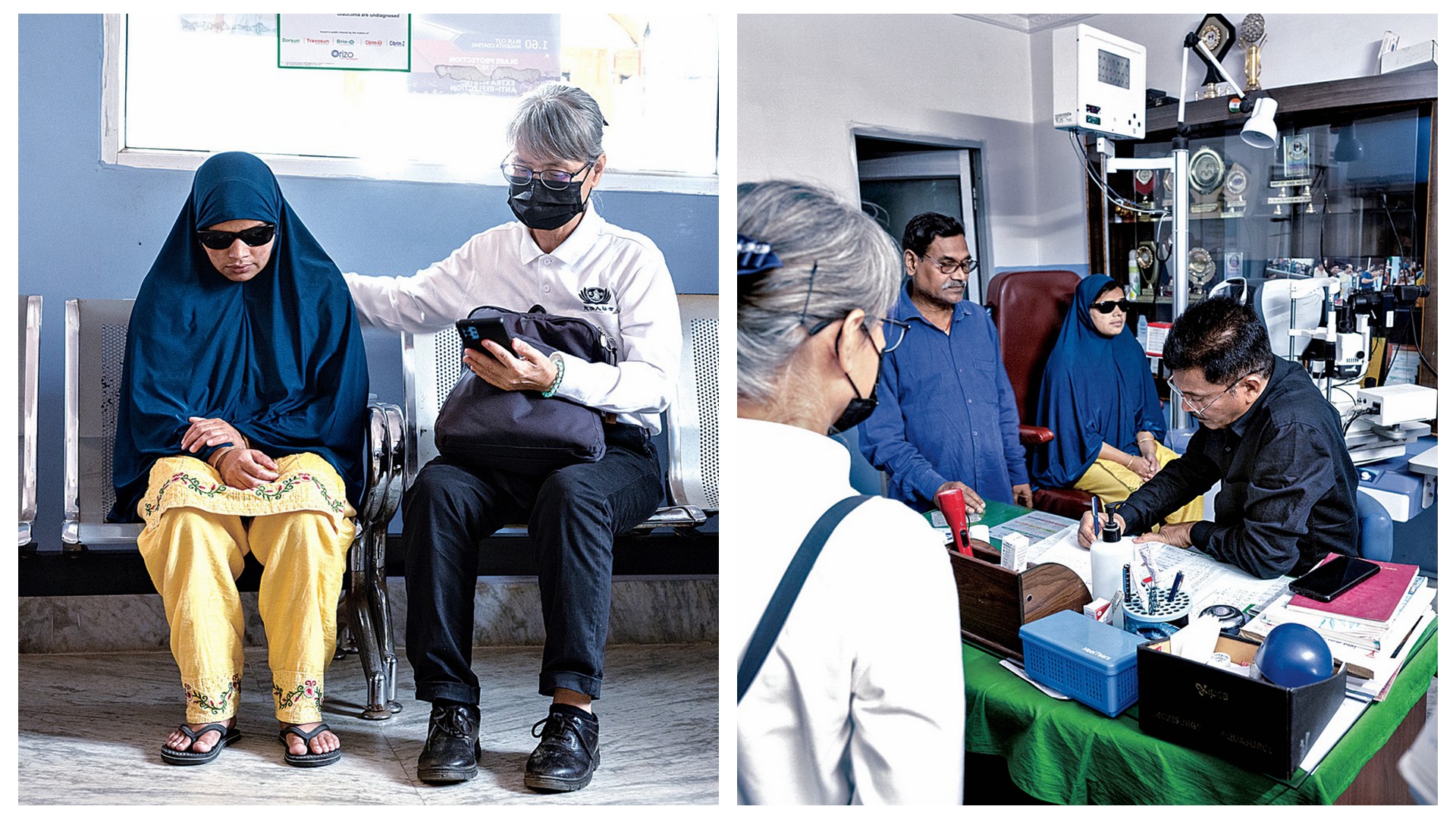
Tzu Chi covered the cost of 10,000 rupees (US$120) for Soni Pravin's eye surgery, easing her eye pain. In the pictures, Tzu Chi volunteers are shown accompanying her for a follow-up visit and consulting with the eye specialist to ensure she receives the best possible care after surgery.
Joy and fulfillment
I followed the Tzu Chi volunteers every day as they carried out their mission. We accompanied patients with eye conditions to their medical appointments, helped disabled individuals find suitable walking aids, checked on the progress of the Great Love Houses, visited schools to learn about local students' learning conditions, and went on pilgrimages to Buddhist heritage sites.
After a month in India, I returned to Taiwan and was diagnosed with pterygium. Reflecting on my eye problem, I couldn't help but wonder how the older volunteers, who had stayed there for much longer, were managing.
A friend once asked me why Tzu Chi volunteers choose to work in such challenging places, doing tough work that doesn't easily yield obvious results. I'm not a volunteer myself, so I can't speak for them, but having spent half a century in the professional world, I found my experience working alongside them to be deeply rewarding. Their efforts are not driven by fame, profit, or the need to make a living. Instead, they come together with a shared commitment to selfless service. Their religious faith gives them a strong sense of purpose, making their work fulfilling and joyful.
Moreover, their work is not just a superficial gesture but provides essential aid for those in genuine need. The people they help truly require support, and their selfless dedication is met with heartfelt gratitude. As a result, those they assist come to see them as family. This kind of relationship and feeling is something you can only truly understand by being a part of it.
The Tzu Chi volunteers in Bodh Gaya are incredibly fortunate. This is where the Buddha attained enlightenment and where Buddhism began. Continuing the compassionate spirit of Buddhism in such a historically significant place is a deeply meaningful experience, more so than anywhere else. Wouldn't you agree?
Contact Us | Plan a Visit | Donate
8 Lide Road, Beitou 11259, Taipei, Taiwan
886-2-2898-9999
005741@daaitv.com
©Tzu Chi Culture and Communication Foundation
All rights reserved.
